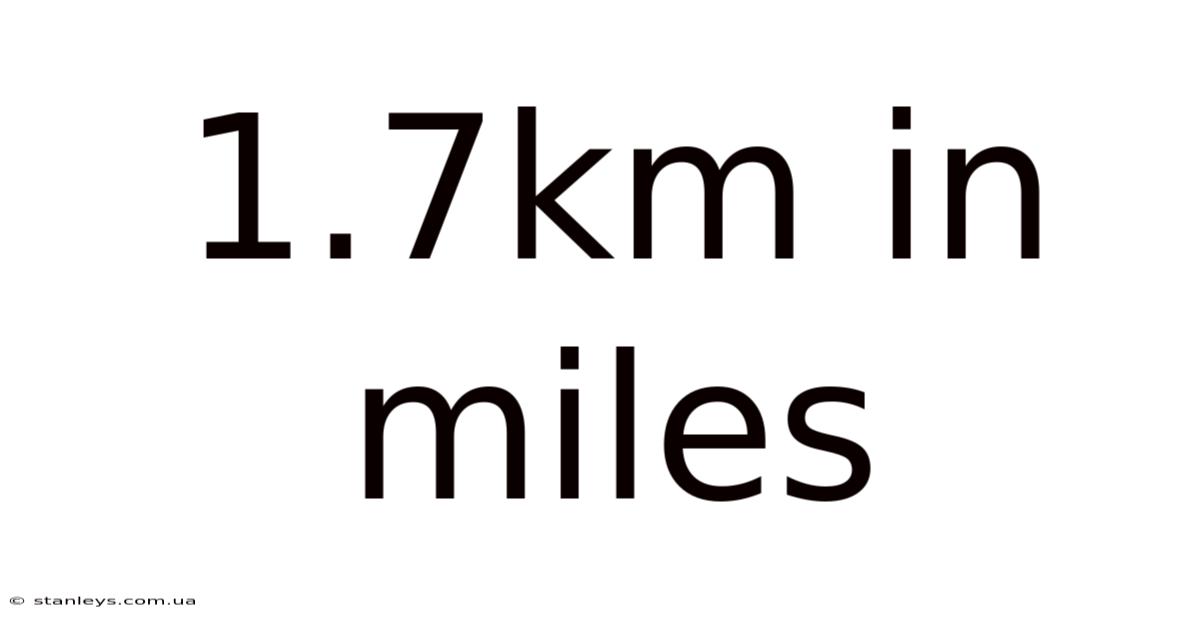1.7km In Miles
stanleys
Sep 13, 2025 · 4 min read

Table of Contents
Converting 1.7km to Miles: A Comprehensive Guide
Converting kilometers to miles is a common task, particularly for those who travel internationally or work with global datasets. Understanding the conversion process isn't just about plugging numbers into a calculator; it's about grasping the fundamental relationship between metric and imperial units. This article will delve into converting 1.7 kilometers to miles, providing a step-by-step guide, exploring the underlying mathematics, addressing frequently asked questions, and even touching upon the historical context of these units of measurement. Whether you're a student needing to solve a problem, a traveler planning a journey, or simply curious about unit conversions, this guide offers a comprehensive understanding of the process.
Understanding Kilometers and Miles
Before we jump into the conversion, let's briefly define our units. A kilometer (km) is a unit of length in the metric system, equal to 1000 meters. The metric system, also known as the International System of Units (SI), is a decimal system based on powers of 10, making conversions relatively straightforward. A mile (mi), on the other hand, is a unit of length in the imperial system, a system historically used in the United States and several other countries. The relationship between miles and other imperial units is less straightforward, leading to more complex conversions.
The Conversion Factor: The Key to Success
The core of any unit conversion lies in the conversion factor. This factor represents the ratio between the two units you're converting. For kilometers and miles, the widely accepted conversion factor is approximately:
- 1 kilometer ≈ 0.621371 miles
This means that one kilometer is roughly equal to 0.621371 miles. The "≈" symbol indicates an approximation, as the conversion is not exact. This slight inaccuracy stems from the historical development of these units, which were not originally defined in relation to each other.
Converting 1.7 Kilometers to Miles: A Step-by-Step Approach
Now, let's convert 1.7 kilometers to miles using the conversion factor:
-
Multiply by the conversion factor: We take the value in kilometers (1.7 km) and multiply it by the conversion factor (0.621371 miles/km):
1.7 km * 0.621371 miles/km ≈ 1.05633 miles
-
Round to the appropriate number of significant figures: Depending on the context, you might need to round your answer. Given that we started with 1.7 km (two significant figures), it's appropriate to round our answer to two significant figures as well:
1.05633 miles ≈ 1.1 miles
Therefore, 1.7 kilometers is approximately equal to 1.1 miles.
A Deeper Dive into the Mathematics: Understanding the Ratio
The conversion factor isn't just a magical number; it's derived from the precise relationship between the meter (the base unit of length in the metric system) and the foot (a base unit in the imperial system). The meter was originally defined based on the circumference of the Earth, while the foot has a more complex and historically variable definition. The conversion factor between kilometers and miles ultimately reflects these historical definitions and the subsequent refinements of these units.
Practical Applications: Real-World Examples
Understanding this conversion is crucial in numerous real-world scenarios:
-
Travel planning: Converting distances between kilometers and miles is vital for international travel, ensuring you can accurately understand distances on maps and itineraries.
-
Sports and fitness: Many fitness trackers and applications allow you to set goals and track progress in either kilometers or miles. Understanding the conversion is essential for accurately comparing your progress across different units.
-
Scientific research: Scientists frequently work with data from various sources, often requiring conversions between metric and imperial units. Accurate conversions ensure consistency and reliability in research findings.
-
Engineering and construction: In global projects, accurate conversion between kilometers and miles is essential for precise measurements and calculations.
Frequently Asked Questions (FAQ)
Q: Is the conversion factor always exact?
A: No, the conversion factor is an approximation. The precise conversion involves more decimal places than are typically needed, and rounding introduces a small margin of error.
Q: Are there online converters for kilometers to miles?
A: Yes, many online converters are available, offering quick and easy conversions between kilometers and miles and other units. However, understanding the underlying process is always beneficial.
Q: What if I need to convert a larger distance, like 170 kilometers?
A: The same principle applies. Multiply 170 km by the conversion factor (0.621371 miles/km), and then round to the appropriate number of significant figures.
Q: Why are there two different systems of measurement?
A: The metric and imperial systems evolved independently, with historical factors contributing to their different definitions and usage. The metric system is now widely adopted internationally due to its simplicity and consistency.
Conclusion: Mastering the Art of Unit Conversion
Converting 1.7 kilometers to miles, while seemingly simple, exemplifies a fundamental concept in measurement: the importance of understanding unit conversions and their underlying mathematical principles. Whether you’re navigating a foreign country, tracking your fitness progress, or performing scientific calculations, the ability to accurately convert between units is invaluable. This article has provided a thorough explanation of the process, highlighting its practical applications and addressing common questions. Remember, the key is mastering the conversion factor and applying it consistently for accurate results. The seemingly small task of converting 1.7km to miles opens a window into a broader understanding of measurement systems and their historical and practical significance.
Latest Posts
Latest Posts
-
52kg In Stones
Sep 13, 2025
-
155 In Kg
Sep 13, 2025
-
Mashed Potato Scoop
Sep 13, 2025
-
1500ml In Pints
Sep 13, 2025
-
Red Color Yellow
Sep 13, 2025
Related Post
Thank you for visiting our website which covers about 1.7km In Miles . We hope the information provided has been useful to you. Feel free to contact us if you have any questions or need further assistance. See you next time and don't miss to bookmark.